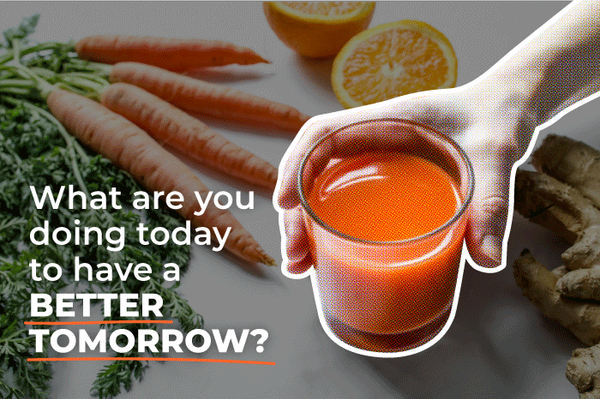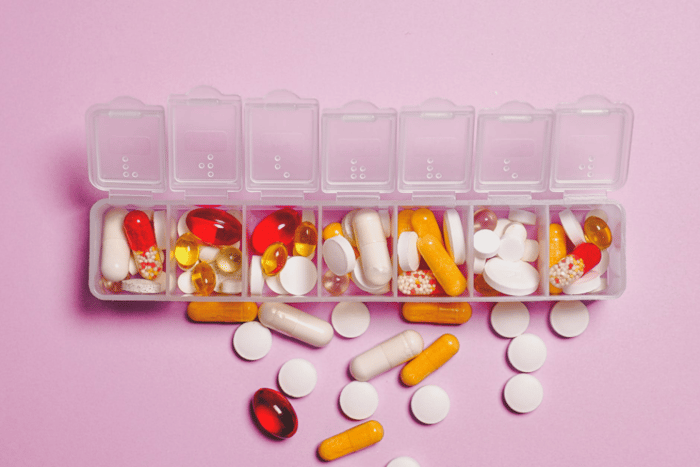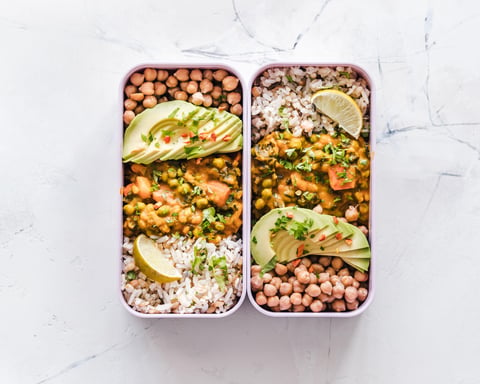
Our bodies require vitamins to stay healthy and function normally. These include fat-soluble vitamins A, D, E, K, and water-soluble vitamins C, B1 (thiamine), B2 (riboflavin), B3 (niacin), B5 (pantothenic acid), B6 (pyridoxal), B7 (biotin), B9 (folate), and B12 (cobalamin).
It can be difficult to navigate the roles and recommended intakes of these vitamins. Don't worry, we've got you covered with easy tips to make sure you're getting enough vitamins!
Do Note: Everyone’s vitamin requirements are different. They vary based on age, gender, pre-existing medical conditions, lifestyle, and the environment you live in. Therefore, consult your local health regulatory authorities or licensed nutritionist for personalized recommendations. Now, let's look at each of these vitamins briefly.
Water and Fat-Soluble Vitamins
Vitamins are either water and fat-soluble. Water-soluble vitamins (C, B1, B2, B3, B5, B6, B7, B9, B12) dissolve with water in the small intestine, but aren't stored in the body and are quickly excreted through urine. Hence, they must be replenished daily.
Fat-soluble vitamins (A, D, E, K), on the other hand, are stored in one's liver and turn into adipose (fat) tissue when not used. Hence, they deplete much more slowly.

Water-soluble Vitamins
Vitamin B1 (Thiamine)
Converts food into energy (cellular respiration)
Maintains healthy hair, skin, muscles, and brain and nerve function
- Recommended Daily Intake (RDI) for adults: Men: 0.9-1.2 mg, Women: 0.8-1.1 mg
- Food sources: Whole grains, fortified bread, cereal, pasta, brown rice, legumes, sunflower seeds, pine nuts, oatmeal, soy milk, watermelon, and acorn squash
Vitamin B2 (Riboflavin)
Converts food into energy (cellular respiration)
Maintains healthy skin, hair
Ensures good blood circulation and well-functioning nervous system
- RDI for adults: Men: 1.2-1.7 mg, Women: 1.1-1.3 mg
- Food sources: Green leafy vegetables (asparagus, spinach), broccoli, enriched whole grains and cereals, and almonds
Vitamin B3 (Niacin)
Maintains healthy skin, hair, blood, and nervous system
- RDI for adults: Men: 16-19 mg, Women: 13-14 mg
- Food sources: Nuts and legumes, enriched and fortified grains and cereals (rice bran, wheat bran), barley, rice, mushrooms, potatoes, and peanut butter
Vitamin B5 (Pantothenic Acid)
Creates lipids, neurotransmitters, steroid hormones, and hemoglobin
- RDI for adults: Men: 5 mg, Women: 5 mg
- Food sources: Whole grains, legumes, mushrooms (especially shiitake), avocados, potatoes, sweet potatoes, broccoli, and brewer’s yeast
Vitamin B6 (Pyridoxal)
Helps lower homocysteine levels (concentration of amino acids in the blood) to prevent arterial damage and blood clots
Helps convert tryptophan to niacin and serotonin (a monoamine neurotransmitter) to promote higher quality sleep, better appetite, and mood
Aids in red blood cell production
Enhances cognitive abilities and immune function
- RDI for adults: Men: 1.3-1.7 mg, Women: 1.2-1.5 mg
- Food sources: Starchy vegetables (asparagus, spinach), peas, okra, celery, legumes (especially chickpeas), soy products, wheat bran, walnuts, flax, sesame, most whole grains, bananas, avocados, and non-citrus fruits
Vitamin B7 (Biotin)
Metabolizes fats, carbohydrates, and protein to energy
Synthesises glucose and fatty acids
Crucial to maintaining healthy bones and hair
- RDI for adults: Men: 30 mcg, Women: 30 mcg
- Food sources: Seeds and nuts, sweet potatoes, spinach, broccoli, whole grains, soybeans, and legumes
Vitamin B9 (Folate/Folic Acid)
Creates DNA and other genetic material
Aids in cell division and creation
Offsets breast cancer risk among women who consume alcohol
Helps prevent brain and spine birth defects when taken early in pregnancy
- RDI for adults: 200-400 mcg
- Food sources: Fortified grains and cereals, asparagus, brussels sprouts, dark green leafy vegetables, oranges, orange juice, peanuts, black-eyed peas, kidney beans, lentils, and chickpeas
Vitamin B12 (Cobalamin)
Helps lower homocysteine levels (amino acids) to prevent arterial damage and blood clots
Assists in cell generation and body's absorption of folic acid
Aids in red blood cell and DNA generation and regulation
Protects nerve cells and encourages their normal growth, guarding against dementia and degenerative diseases
- RDI for adults: 2-2.4 mcg
- Food sources: Fortified cereals, fortified soy milk, and nutritional yeast.

Do Vegans have vitamin b12 deficiency?
While many people can have a B-12 deficiency, vegans (and vegetarians) are at higher risk of it, given the most reliable dietary sources of vitamin B12 are found in animal-derived products.
Some plant-based individuals who consume folate-rich foods, such as legumes, leafy greens, and citrus fruits, in their diet may mask vitamin B12 deficiency. This is because high folate levels can reduce the extent of anemia caused by vitamin B12 deficiency (pernicious anemia). They may experience subtle signs of neurological damage (weakness in limbs, fatigue, and weakness) indicating a vitamin B12 deficiency, or seem generally healthy. This makes early detection of vitamin B12 deficiency more difficult.
Given that vitamin B12 is stored in substantial amounts in the liver until it's needed by the body, it takes approximately 3 to 5 years to completely exhaust it. Hence, vegans who don't take vitamin B12 supplements or vitamin B12 fortified foods may only observe anemia years after making the dietary change.
If you're following a plant-based lifestyle, you're encouraged to consume vegan vitamin B12 supplements to ensure your B12 stores aren't depleted.
It's important to note that B12 deficiency doesn't affect only vegans and vegetarians but is more widespread among the general population than we think. So, vegan or not, everyone is encouraged to take a B12 analysis test to make sure they've sufficient B12 intake.
Some of the best-rated Vitamin B12 Supplements on abillionveg are: Solgar Sublingual Vitamin B12 Supplement, Deva Vegan B12 With Folic Acid, and B6 and Saturn B12 Cardio Essential.
Vitamin C (Ascorbic Acid)
Acts as an antioxidant that neutralizes unstable molecules which can damage cells
Helps make collagen, a connective tissue
Plays an important role in skin structure and wound healing
Maintains and supports blood vessel layers
Bolsters the immune system to fight against illnesses and infections
Promotes healthy teeth and gums
Helps the body absorb Iron
- Avg. RDI for adults: Men: 40-90 mg, Women: 30-75 mg.
- Food sources: Citrus fruits, Kakadu plums, acerola cherries, broccoli, bell peppers, spinach, strawberries, cantaloupe, baked potatoes, and tomatoes.

Fat-Soluble Vitamins
Vitamin A
Helps the body's immune system defend against illness and infection
Aids in bone growth
Keeps the skin and lining of some parts of the body, such as the nose, healthy
Lowers risk for some cancers (diets rich in carotenoids may lower lung cancer risk. Foods rich in lycopene, a bright red carotenoid, may lower prostate cancer risk)
- RDI for adults: Men: 700-900 mcg, Women: 600-750 mcg
- Food sources: Green leafy vegetables, orange and yellow vegetables, cantaloupe, apricots, and mangoes
Vitamin A compounds are split into two groups, preformed vitamin A (Retinoids) and provitamin A (Carotenoids). Preformed vitamin A is the active form of the vitamin and is found in animal-derived foods. Provitamin A is a precursor of vitamin A found in plant-based foods which are then converted into the active form in your body. On a plant-based diet, you can obtain an adequate intake of vitamin A simply through consuming foods rich in carotenoids.
Vitamin D (Calciferol)
Helps maintain normal calcium and phosphorus levels, which develop and strengthen bones
Helps form teeth
Maintains bone health and reduces the risk of hip fractures among the elderly
Aids neuromuscular functioning
- RDI for adults: 2.5-15 mcg, depending on the sun exposure you receive
- Food sources: Fortified plant-based milk, orange juice, mushrooms, plant-based yogurt, soy beverages, and fortified cereals
Direct sun exposure is the best source of Vitamin D. The sun's ultraviolet B (UVB) rays interact in the skin with a protein called 7-DHC, converting it into vitamin D3 or cholecalciferol, the active form of vitamin D.
However, people living in regions with low sun exposure may not be able to receive adequate vitamin D3 by just stepping outside, especially in winter months when the UVB radiation is low. This lowers calcium absorption and adversely affects the musculoskeletal system, making bones and teeth brittle in the long run. To avoid these outcomes, you can consider taking Vitamin D supplements after consulting your physician.
Some of the best-rated vitamin D supplements on abillionveg are: Doctor's Best Vegan D3, Dulzura Natural Vitamin D2, and MRM Vegan Vitamin D3 2,5000 IU.

Vitamin E (Alpha-Tocopherol)
Acts as an antioxidant, neutralizing free radicals that can damage cells.
Helps form red blood cells
Helps the body use Vitamin K for blood clotting
Protects vitamin A and certain lipids from damage
Diets rich in vitamin E may reduce the risk of Alzheimer's disease
- RDI for adults: 15 mg
- Food sources: Plant-based oils (wheat germ, sunflower, soybean, safflower, rapeseed, olive), almonds, sunflower seeds, collard greens, beet greens, spinach, asparagus, red bell pepper, peanuts and peanut butter, mangoes, avocados, pumpkins, fortified breakfast cereals, and fruit juice
 Neutral Taste Coconut Oil reviewed by @maesti
Neutral Taste Coconut Oil reviewed by @maesti
Vitamin K
Activates proteins and calcium essential to blood clotting
May reverse the calcification of arteries (the buildup of calcium which narrows blood vessels, leading to the development of heart disease)
Essential to bone health and may help prevent hip fractures
- RDI for adults: Men: 120 mcg, Women: 90 mcg
- Food sources: Phylloquinone (vitamin K1): Spinach, boiled collard greens, turnip greens, broccoli. Menadione (vitamin K2): Natto
 Natto Kotsubu Yuzu reviewed by @morethanveggies
Natto Kotsubu Yuzu reviewed by @morethanveggies
We all need both Phylloquinone (K1) and Menadione (K2) for healthy physiological functions. Phylloquinone is primarily found in green, leafy vegetables, while Menadione is present in animal and fermented foods as they are from bacterial origin. The human gut also produces long-chain menadiones in sufficient amounts, so you don't have to consume animal products.
However, if you're concerned that you've insufficient intake of Menadione (K2) on a plant-based diet, try eating natto. It's a fermented soybean that boasts an incredible 10mcg of Vitamin K-2 per gram. You only need a few grams to meet your RDI. Other vegetable sources include boiled collards (530mcg of Vitamin K per half cup) and turnip greens (426mcg per half a cup).
All this may be a lot to take in, but to ensure you're getting your required vitamins, eat a wide variety of plant-based foods from various food groups. You can go about this is by following the plate method we mentioned in our Vegan Nutrition Guide.







